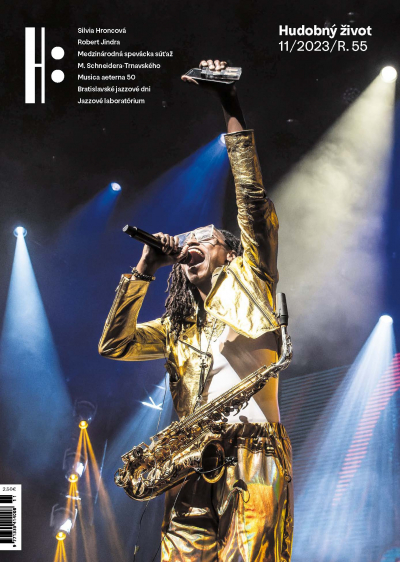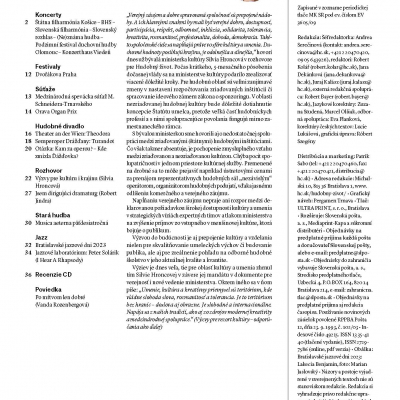
Hudobný život 11/2023
back to list

-
Autor:
rôzni
-
Category:
-
ISBN:
13 35-41 40
-
Published:
2023
-
Number of pages:
40
-
Price incl. VAT:
€2,50
-
Price without VAT:
€2.08
- Free delivery in Slovakia by Slovak Post!
-
Stock status:
In stock
- Order a subscription
- Buy a digital version
Disclaimer: Please note that Hudobný život, the magazine mentioned in this text, is written in the Slovak language.
For non-Slovak readers who would like to read the printed or electronic version of the magazine, we recommend seeking out translation services or resources to help with understanding the content. One option may be to use online translation tools such as Google Translate or Microsoft Translator, although we cannot guarantee the accuracy of these services.
We apologize for any inconvenience this may cause, and we appreciate your interest in our publication.
The November issue of Musical Life brings:
- Interview with former Minister of Culture Silvia Hroncova
- Interview with Czech conductor Robert Jindra, the chief of the State philharmonic Košice
- International singing competition M. Schneider-Trnavsky in retrospect by Prof. Eva Blahova
- Reflection on concerts from Košice through Bratislava to Vienna, opera reviews, and CD reviews
- Bratislava Jazz Days through the perspectives of Lakecia Benjamin and Theo Croker
- Musica Aeterna 50
"Public interest and well-governed society are interconnected vessels. Their main features should be public good, accessibility, participation, respect, expertise, inclusion, solidarity, tolerance, creativity, diversity, professionalism, freedom, and democracy. Such societal goals are fulfilled in the sphere of culture and art. Spiritual values strengthen the country; it becomes more resilient and stronger," says former Minister of Culture Silvia Hroncova in an interview for Musical Life. During her brief five-month tenure in the temporary government, several important steps were taken at the Ministry of Culture. For the music sector, interesting changes in the allocation of budgets for established institutions and the processing of the conceptual intention of the sponsorship law have been realized. In the field of non-established musical culture, it will be important to finalize the concept of the Artist's Statute because a large part of musical professions and cooperating occupations operate outside the framework of employment. We also talked with the former minister about the insufficient cooperation between established (state) musical institutions. However, what is almost absent is an understanding of the meaningful relationship between established and non-established culture. There is a lack of a sense of belonging in one space of cultural services. Transformed into detail, this can be manifested, for example, by concessional rents for representative music halls to "independent" operators, organizers of musical events, thanks to a clear distinction between commercial and public interest. The fulfillment of public interest is not favored by the contradiction between the declared requirement of broad accessibility to culture and art in the strategic visions of expert teams and the ministry's pressure to increase revenue from admission in minority culture, which is fighting for an audience. A challenge for the future is also the connection between culture and education, not only for improving artistic education or building an audience but also for realizing the view of professional music education in its current quality and quantity. There are many challenges today, and the team of Silvia Hroncova summarized those for the culture and art sector at the end of her mandate in a document for the public and the new leadership of the ministry. Among other things, it states: "Art, culture, and the creative industry are territories where freedom of speech, diversity, and tolerance prevail. It is a territory without borders - literally and metaphorically. It is free and international. It draws from our traditions as well as from sources of modern creativity and international cooperation." (Challenges for the cultural sector - recommendations for the future)Andrea Serečinová

